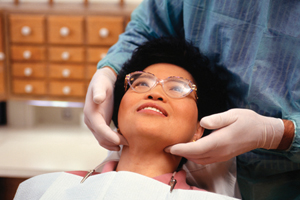
A project of the U.S. Department of Health and Human Services Office on Women's Health


Brush your teeth after eating. Floss every day. See your dentist for routine checkups.
You've heard it all before. But did you know good oral health could save more than your teeth?
According to the American Dental Association, three out of four adults are affected by gum disease at some point in their lives. And women are especially at risk because of life-long hormone changes. For example, menopausal and postmenopausal women produce less saliva, which can lead to dry mouth. Untreated, dry mouth can lead to cavities. Also, many medications can cause dry mouth and other dental side effects. Some diseases, like diabetes, increase the risk of gum disease. Smoking also increases the risk of gum disease. Gum disease as well as tooth decay take a serious toll. According to the Centers for Disease Control and Prevention, one-fourth of adults over age 65 have lost all their teeth.
However, research suggests an even greater toll. The cause is not clear, but studies have shown that gum disease is related to heart disease. According to the American Academy of Periodontology, people with gum disease are almost twice as likely to have thickening of the coronary arteries – the blood vessels that lead to the heart.
Most oral and tooth disease is preventable. Keep your mouth healthy with regular brushing, flossing, and eating healthy foods. If you wear dentures, remove them at night and clean before wearing. See your dentist if you notice loose teeth, bleeding during brushing, red and swollen gums, or any other unusual changes.
Content last updated August 12, 2010.
Resources last updated August 12, 2010.